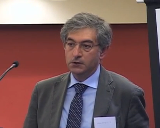Studiare
In questa sezione è possibile reperire le informazioni riguardanti l'organizzazione pratica del corso, lo svolgimento delle attività didattiche, le opportunità formative e i contatti utili durante tutto il percorso di studi, fino al conseguimento del titolo finale.
Calendario accademico
Il calendario accademico riporta le scadenze, gli adempimenti e i periodi rilevanti per la componente studentesca, personale docente e personale dell'Università. Sono inoltre indicate le festività e le chiusure ufficiali dell'Ateneo.
L’anno accademico inizia il 1° ottobre e termina il 30 settembre dell'anno successivo.
Calendario didattico
Il calendario didattico indica i periodi di svolgimento delle attività formative, di sessioni d'esami, di laurea e di chiusura per le festività.
| Periodo | Dal | Al |
|---|---|---|
| TERP 3A1S | 1-ott-2019 | 8-nov-2019 |
| TERP 2A1S | 7-ott-2019 | 6-dic-2019 |
| TERP 1A1S | 9-ott-2019 | 13-dic-2019 |
| TERP 3A2S - 1 periodo | 3-feb-2020 | 13-mar-2020 |
| TERP 1A2S - 1 periodo | 3-feb-2020 | 6-mar-2020 |
| TERP 2A2S | 9-mar-2020 | 15-mag-2020 |
| TERP 1A2S - 2 periodo | 8-apr-2020 | 24-mag-2020 |
| TERP 3A2S - 2 periodo | 4-mag-2020 | 8-mag-2020 |
| Sessione | Dal | Al |
|---|---|---|
| TERP ROV SESSIONE INVERNALE 2 ANNO | 16-dic-2019 | 24-gen-2020 |
| TERP ROV SESSIONE INVERNALE (1 e 3 ANNO) | 7-gen-2020 | 31-gen-2020 |
| TERP ROV SESSIONE ESTIVA 2 ANNO | 25-mag-2020 | 26-giu-2020 |
| TERP ROV SESSIONE ESTIVA 3 ANNO | 1-lug-2020 | 31-lug-2020 |
| TERP ROV SESSIONE ESTIVA 1 ANNO | 6-lug-2020 | 31-lug-2020 |
| TERP ROV SESSIONE AUTUNNALE | 1-set-2020 | 30-set-2020 |
| Sessione | Dal | Al |
|---|---|---|
| TERP SESSIONE AUTUNNALE | 1-nov-2020 | 31-dic-2020 |
| TERP SESSIONE PRIMAVERILE | 1-mar-2021 | 30-apr-2021 |
| Periodo | Dal | Al |
|---|---|---|
| FESTIVITA' OGNISSANTI | 1-nov-2019 | 1-nov-2019 |
| FESTIVITA' IMMACOLATA CONCEZIONE | 8-dic-2019 | 8-dic-2019 |
| VACANZE DI NATALE | 24-dic-2019 | 6-gen-2020 |
| VACANZE DI PASQUA | 10-apr-2020 | 15-apr-2020 |
| FESTA DELLA LIBERAZIONE | 25-apr-2020 | 25-apr-2020 |
| Festa del Lavoro | 1-mag-2020 | 1-mag-2020 |
| FESTA DELLA REPUBBLICA | 2-giu-2020 | 2-giu-2020 |
| FESTA S. PATRONO | 5-ago-2020 | 5-ago-2020 |
| Descrizione | Periodo | Dal | Al |
|---|---|---|---|
| TERP 3^ anno - 1^semestre | TERP 3^ anno - 1^semestre | 11-nov-2019 | 13-dic-2019 |
| TERP 2^ anno - 1^semestre | TERP 2^ anno - 1^semestre | 27-gen-2020 | 6-mar-2020 |
| TERP 1^ anno - 2^semestre (1 periodo) | TERP 1^ anno - 2^semestre (1 periodo) | 9-mar-2020 | 3-apr-2020 |
| TERP 3^ anno - 2^semestre (1 periodo) | TERP 3^ anno - 2^semestre (1 periodo) | 16-mar-2020 | 30-apr-2020 |
| TERP 3^ anno - 2^semestre (2 periodo) | TERP 3^ anno - 2^semestre (2 periodo) | 11-mag-2020 | 19-giu-2020 |
| TERP 1^ anno - 2^semestre (2 periodo) | TERP 1^ anno - 2^semestre (2 periodo) | 25-mag-2020 | 26-giu-2020 |
| TERP 2^ anno - 2^semestre (1 periodo) | TERP 2^ anno - 2^semestre (1 periodo) | 29-giu-2020 | 31-lug-2020 |
| TERP 2^ anno - 2^semestre (2 periodo) | TERP 2^ anno - 2^semestre (2 periodo) | 1-set-2020 | 30-set-2020 |
Calendario esami
Gli appelli d'esame sono gestiti dalla Unità Operativa Segreteria Corsi di Studio Medicina.
Per consultazione e iscrizione agli appelli d'esame visita il sistema ESSE3.
Per problemi inerenti allo smarrimento della password di accesso ai servizi on-line si prega di rivolgersi al supporto informatico della Scuola o al servizio recupero credenziali
Per dubbi o domande leggi le risposte alle domande più frequenti F.A.Q. Iscrizione Esami
Docenti
 loretta.berti@univr.it
loretta.berti@univr.it
 borghesi.a@mail.apss.tn.it
borghesi.a@mail.apss.tn.it
 silvia.chiesa@apss.tn.it
silvia.chiesa@apss.tn.it
 drgasp@tin.it
drgasp@tin.it
 enrica.latterini@apss.tn.it
enrica.latterini@apss.tn.it
 renata.lazzeri@apss.tn.it
renata.lazzeri@apss.tn.it
 anja.meyer@univr.it
anja.meyer@univr.it
 rocco.micciolo@economia.unitn.it
rocco.micciolo@economia.unitn.it
 antonio.nocera@univr.it
antonio.nocera@univr.it
 stefania.pontrandolfo@univr.it
stefania.pontrandolfo@univr.it
Piano Didattico
Il piano didattico è l'elenco degli insegnamenti e delle altre attività formative che devono essere sostenute nel corso della propria carriera universitaria.
Selezionare il piano didattico in base all'anno accademico di iscrizione.
1° Anno
| Insegnamenti | Crediti | TAF | SSD |
|---|
2° Anno Attivato nell'A.A. 2020/2021
| Insegnamenti | Crediti | TAF | SSD |
|---|
3° Anno Attivato nell'A.A. 2021/2022
| Insegnamenti | Crediti | TAF | SSD |
|---|
| Insegnamenti | Crediti | TAF | SSD |
|---|
| Insegnamenti | Crediti | TAF | SSD |
|---|
| Insegnamenti | Crediti | TAF | SSD |
|---|
Legenda | Tipo Attività Formativa (TAF)
TAF (Tipologia Attività Formativa) Tutti gli insegnamenti e le attività sono classificate in diversi tipi di attività formativa, indicati da una lettera.
Fondamenti psicologici e sociali della vita individuale e di relazione (2019/2020)
L'insegnamento è organizzato come segue:
Obiettivi formativi
The aim of the course is to provide students with useful tools to understand the contexts and processes of care and strategies to favor the therapeutic relationship with the assisted persons through the analysis of social and individual behavior. they favor the management of communication and the development of self-awareness in the operator of their experiences. CULTURAL ANTHROPOLOGY MODULE Training objectives: Understand and critically appropriate theoretical tools typical of anthropology to improve intervention in the contexts of care, assistance and social-health management. CLINICAL PSYCHOLOGY MODULE Training objectives: To provide a historical methodological matrix of the clinical approach in psychology. Present communication and relational tools useful to know and manage the relationship with users and their families. Introduce functions and ways to promote self-awareness in the operator of their emotional states. MODULE SOCIAL PSYCHOLOGY Educational objectives: The objective is to present in a conceptually and thematically integrated way the social behavior and the science that studies it. The aim is to give students the opportunity to understand Social Psychology and to draw knowledge applicable to their future work and daily life. At the end of the course students will be able to: • Describe the study objectives of social psychology • Recognize the effects of the group and the "social" on our perception • Identify the effects of social influence on opinions and attitudes • Recognize and describe the variables involved in social relationships • Describe the concept of self and self-esteem and identify the modalities of their formation, modification • Present the concepts of locus of control and self efficacy and describe their use for their own and others growth • Provide a definition of stress and psychosocial risks • Identify the variables involved in the stress experience and the most effective ways of coping
Bibliografia
| Autore | Titolo | Casa editrice | Anno | ISBN | Note |
|---|---|---|---|---|---|
| Palmonari, Cavazza, Rubini | Psicologia sociale | Il Mulino | 2012 | ISBN 8815239537 | |
| William R. Miller e Stephen Rollnick | Il colloquio motivazionale | Erickson | 2004 | ||
| Sanavio E, Cornoldi C | Psicologia Clinica. | Ed. Il Mulino, Bologna. | 2001 | ||
| Rossi N | Psicologia Clinica per le professioni sanitarie. | Ed. Il Mulino, Bologna. | 2004 | ||
| Ripamonti e Clerici | Psicologia e salute | Il Mulino, Bologna | 2008 | ||
| Remotti, Francesco | Prima lezione di antropologia | Laterza | 2000 | 9788842060093 | Vanno bene tutte le edizioni del volume a partire dalla prima del 2000 |
Prospettive
Avvisi degli insegnamenti e del corso di studio
Per la comunità studentesca
Se sei già iscritta/o a un corso di studio, puoi consultare tutti gli avvisi relativi al tuo corso di studi nella tua area riservata MyUnivr.
In questo portale potrai visualizzare informazioni, risorse e servizi utili che riguardano la tua carriera universitaria (libretto online, gestione della carriera Esse3, corsi e-learning, email istituzionale, modulistica di segreteria, procedure amministrative, ecc.).
Entra in MyUnivr con le tue credenziali GIA: solo così potrai ricevere notifica di tutti gli avvisi dei tuoi docenti e della tua segreteria via mail e a breve anche tramite l'app Univr.
Orario lezioni
Documenti
| Titolo | Info File |
|---|---|
|
|
pdf, it, 66 KB, 22/09/23 |
|
|
pdf, it, 293 KB, 12/04/24 |
|
|
pdf, it, 259 KB, 10/04/24 |
|
|
pdf, it, 32 KB, 05/03/24 |
|
|
pdf, it, 1453 KB, 15/02/24 |
Gestione carriere
Prova Finale
Per essere ammessi alla prova finale occorre avere conseguito tutti i crediti nelle attività formative previste dal piano degli studi, compresi quelli relativi all’attività di tirocinio.
Alla preparazione della tesi sono assegnati 7 CFU.
La prova è organizzata, con decreto del Ministro dell'Istruzione, dell'Università e della Ricerca di concerto con il Ministro del Lavoro, della Salute e delle Politiche Sociali, in due sessioni definite a livello nazionale.
La prova finale, con valore di esame di Stato abilitante, si compone di:
- una prova pratica nel corso della quale lo studente deve dimostrare di aver acquisito le conoscenze e abilità teorico-pratiche e tecnico-operative proprie dello specifico profilo professionale;
- redazione di un elaborato di una tesi e sua dissertazione.
Lo studente avrà la supervisione di un docente del Corso di Laurea, detto Relatore, ed eventuali correlatori anche esterni al Corso di Laurea.
Scopo della tesi è quello di impegnare lo studente in un lavoro di formalizzazione,
progettazione e di ricerca, che contribuisca sostanzialmente al completamento della sua formazione professionale e scientifica. Il contenuto della tesi deve essere inerente a tematiche o discipline strettamente correlate al profilo professionale.
La valutazione della tesi sarà basata sui seguenti criteri: livello di approfondimento del lavoro svolto, contributo critico del laureando, accuratezza della metodologia adottata per lo sviluppo della tematica.
Il punteggio finale di Laurea è espresso in cento/decimi con eventuale lode e viene
formato, a partire dalla media ponderata rapportata a 110 dei voti conseguiti negli esami di profitto, dalla somma delle valutazioni ottenute nella prova pratica (fino ad un massimo di 5 punti) e nella discussione della Tesi (fino ad un massimo di 6 punti).
La commissione di Laurea potrà attribuire ulteriori punti anche in base a:
presenza di eventuali lodi ottenute negli esami sostenuti; partecipazione ai programmi Erasmus 2 punti aggiuntivi; laurea entro i termini della durata normale del corso 2 punti aggiuntivi.
È prevista la possibilità per lo studente di redigere l'elaborato in lingua inglese.
La scadenza per la presentazione della domanda di laurea e relativa documentazione verrà indicata negli avvisi dello specifico Corso di laurea
Documenti
| Titolo | Info File |
|---|---|
|
|
pdf, it, 278 KB, 22/03/24 |
Appelli d'esame
AVVISO IMPORTANTE
Documenti
| Titolo | Info File |
|---|---|
|
|
pdf, it, 313 KB, 02/10/23 |
Area riservata studenti
Attività Seminariali/a scelta dello studente
Attività Seminariali/a scelta dello studente
Tirocinio professionalizzante
Documenti
| Titolo | Info File |
|---|---|
|
|
pdf, it, 146 KB, 15/02/24 |
 045 8009841
045 8009841




















